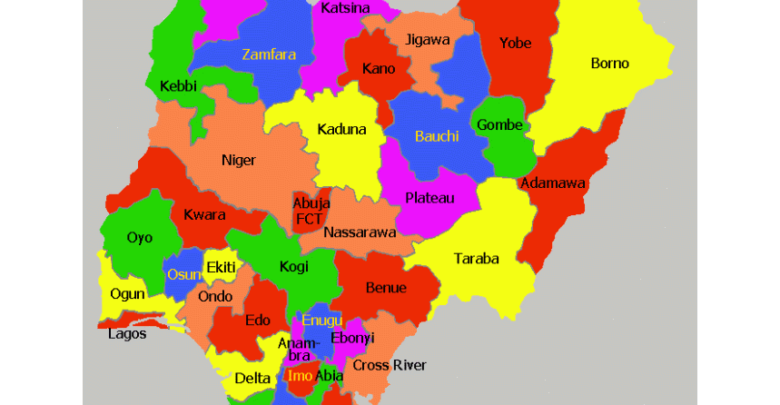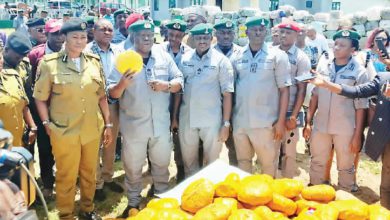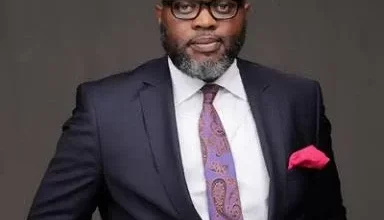
….with leadership and a sense of purpose, we can lift 100 million Nigerians out of poverty in ten years — President Buhari, June 12, 2019, in Abuja
POSSIBLY, several of the card-carrying members of the All Progressives Congress, APC, present clapped lustily when the President made that statement. That is to be expected. Loyal politicians at campaign rallies are not expected to think critically about what their leaders say. Their role is to applaud anything pronounced. Other observers still in possession of their thinking caps could easily determine that the statement was totally empty for several reasons. Five reasons will be sufficient to illustrate the point.
First, Buhari said “with leadership”, not “with my leadership”. It might appear like quibbling with semantics, but, other leaders embarking their nations on a new and prosperous direction have always emphasised their contributions to the achievements envisaged. Second, at close to 78, and only four years to go, all being well, Buhari is speculating on an objective well beyond his tenure. Even if he regards himself as the leader with a sense of purpose, he will not be around for sixty percent of the ten years to pilot the ship of the Nigerian State. Third, it is safe to assume that the ten years have not commenced now in 2019. With the Gross Domestic Product, GDP, in the first quarter, Q1, of 2019, growing at a miserable under 2 percent and less than Q4 of 2018, Nigeria has added more people to those living in poverty instead of lifting them out of it. From all appearances, 2019 is certainly not the first year of the ten. Fourth, Nigeria, under APC government, is again repeating all the mistakes which make it unlikely that we will ever achieve the remarkable economic transformations which enabled China, India, and Indonesia, the three countries mentioned in the June 12 address to escape mass poverty.
The Nigerian president was declared a winner in February this year. India’s prime minister was re-elected more than two months after that. The Indian prime minister announced his cabinet 72 hours after the results of the election. Nigeria still has no ministers. The difference is clear between a purposeful prime minister, leader and his Nigerian counterpart. By the time you read this article, June will almost be over. The first half of 2019 will soon be gone. Purposeful leaders recognise time as an economic resource almost at par with capital, labour, and infrastructure. They never waste time or encourage their subordinates to do the same. Ministers appointed after June will spend the rest of the year coming to grips with their scope of responsibilities. Nothing much can be expected of them. Ministers who attempt to “hit the ground running” – to use the hackneyed expression of journalists – invariably lead their Ministries into blind alleys. An example was the former Minister of Transportation, Mr Rotimi Amaechi, who made grand promises about the Lagos-Ibadan and the Lagos-Calabar rail lines in 2016.
The first should have been in operation now according to him. Not only is there no rail commuter service between Lagos and Ibadan, but international experts are also now telling us that the Nigerian rail line costs have been grossly padded. Time lost; money lost. The Nigerian president made no personal commitment to achieving the objective stated. It was more of an academic exercise. By contrast, when President John Kennedy of America, after the Russians sent an astronaut into space announced that “by the end of the decade America will send a man to the moon and bring him back” he had provided a timeline for the objective. America was challenged to reach the moon by December 1969. Even though Kennedy was assassinated in 1963, the USA achieved the goal ahead of time. Two purposeful Presidents after Kennedy – Johnson and Nixon – made sure that happened. But, Kennedy got the ball rolling by establishing the framework for success. He got the brightest and best Americans to work on the project.
By contrast, Buhari has not established the Economic Management Team which will make it possible for Nigeria to lift 100 million out of poverty in ten years. That explains the difference between purposeful leadership and wishful thinkers. Fifth, if a purposeful leader can be defined as one who does not ignore clear threats to the economy and security of his nation, then Buhari has failed on, at least, two instances. China, India, and Indonesia would not have allowed trucks to block the road to their major ports for three weeks because their leaders are aware of the undesirable consequences. Nigeria allowed its major ports to be blockaded for over three years without government action. Even today we are witnessing an impotent government which issued a 72 hour quit notice to the criminal road blockers and three weeks after, they are still there. It would never happen in China.
Similarly, when herdsmen terrorist first started to imperil the security of the nation, the Federal Government of Nigeria could not foresee the danger to our food security. First, the problem was ignored. Herdsmen killed about 300 citizens in Agatu, Benue State, the nation’s main food production belt, and the President of Nigeria did not even visit the place nor send relief materials. Then, excuses followed. In a shameless demonstration of blaming the victims, the government announced that herdsmen were provoked when Benue State passed a no grazing law. Yet, the pogrom at Agatu occurred over one year before the law was passed. Then the herdsmen went to Plateau State which had no law prohibiting grazing. Soon a government spokesman announced to fellow Nigerians that we have two options: our land or our lives. In all these, the short-sighted leaders in Abuja acted as if they actually expected to promote one lawless group without instigating reprisals. Cattle rustlers soon emerged and they too were ignored. Then bandits and kidnappers increasingly took over Zamfara and Katsina States. They too were ignored because our leaders had an election to face. All those threats to lives and properties could wait while they went after the precious second term.
The second term has now been secured. But, on June 12, while the President of Nigeria was announcing that Nigeria could lift 100 million people out of poverty in ten years, bandits again invaded his state and carried off a village head. The terrorists now control more of Zamfara and Katsina States than the Federal Government and the State governments do. On June 18, 2019, the Chief of Army Staff, CoAS, General Tukur Buratai, who a few days before had boasted that Boko Haram was finished, had to eat his words after the insurgents attacked several army bases killing unknown numbers of soldiers. According to the CoAS, “It is unfortunate, but the truth is that almost every setback the Nigerian army has had in our operations in recent times can be traced to the insufficient commitment to a common national and military course by those at the frontlines.” Buratai was being economical with the truth. He should simply have said, “Fellow Nigerians, please say your last prayers.”
He has just announced that the Nigerian army is ill-prepared to fight and win this war. Meanwhile, we must bear in mind that we have a retired Major General as President and he was elected and re-elected because Nigerians thought that he could provide security for rapid economic growth to occur. At the start of his fifth year in office, Nigeria is now more insecure than in 2015. Even his state – Katsina — is now under siege unlike 2015. Obviously, no purposeful leader would allow the security situation to deteriorate under him and allow truckers to openly defy his orders and close the nation’s ports for three years. We cannot be like China, India and Indonesia because we don’t have a leader like theirs.



